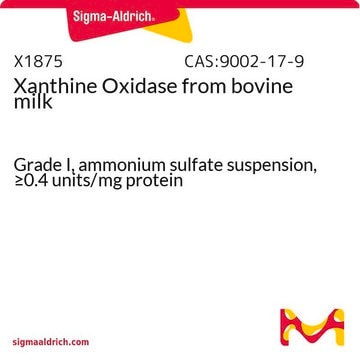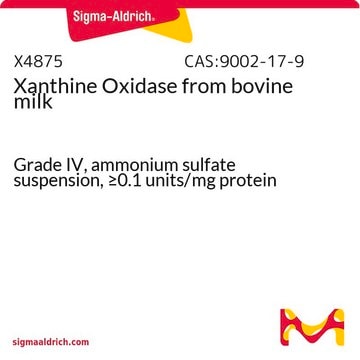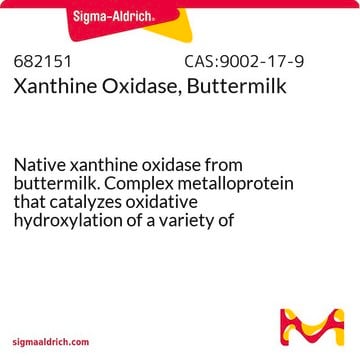X4376
Xanthine Oxidase from bovine milk
lyophilized powder, 0.4-1.0 units/mg protein
Synonym(s):
XOD, Xanthine:oxygen oxidoreductase
Sign Into View Organizational & Contract Pricing
All Photos(3)
About This Item
CAS Number:
Enzyme Commission number:
1.17.3.2.
EC Number:
MDL number:
UNSPSC Code:
12352204
NACRES:
NA.54
Recommended Products
biological source
bovine milk
Quality Level
form
lyophilized powder
specific activity
0.4-1.0 units/mg protein
mol wt
283 kDa
composition
Protein, 10.0-25.0%
storage temp.
2-8°C
Looking for similar products? Visit Product Comparison Guide
General description
Formerly E.C. 1.1.3.22
Application
Xanthine Oxidase from bovine milk has been used as a source for superoxide generation. It has also been used as a model enzyme in the internally calibrated electrochemical continuous enzyme assay (ICECEA).
Biochem/physiol Actions
The isoflavanoid genistein was shown to inhibit xanthine oxidase at concentrations between 0.1-4.0 μM and then activate xanthine oxidase at concentrations higher than 5 μM.
Xanthine Oxidase acts as a potential biomarker for oxidative stress. It is also implicated in tissue and vascular injuries such as liver damage, inflammatory diseases and chronic heart failure.
Xanthine oxidase is a molybdenum-containing enzyme that is found in the cytosol, and may be strongly inhibited by flavonoids. It plays a vital role in the metabolism of some drugs, as well as purines and pyrimidines. It is also known to be a biological source of reactive oxygen species.
Unit Definition
One unit will convert 1.0 μmole of xanthine to uric acid per min at pH 7.5 at 25 °C. Approx. 50% of the activity is obtained with hypoxanthine as substrate.
Physical form
Contains 0.5% sodium salicylate.
Analysis Note
Protein determined by biuret
Signal Word
Danger
Hazard Statements
Precautionary Statements
Hazard Classifications
Resp. Sens. 1
Storage Class Code
11 - Combustible Solids
WGK
WGK 3
Flash Point(F)
Not applicable
Flash Point(C)
Not applicable
Personal Protective Equipment
dust mask type N95 (US), Eyeshields, Gloves
Certificates of Analysis (COA)
Search for Certificates of Analysis (COA) by entering the products Lot/Batch Number. Lot and Batch Numbers can be found on a product’s label following the words ‘Lot’ or ‘Batch’.
Already Own This Product?
Find documentation for the products that you have recently purchased in the Document Library.
Customers Also Viewed
Massimiliano Magro et al.
Materials (Basel, Switzerland), 13(7) (2020-04-16)
Generally, enzyme immobilization on nanoparticles leads to nano-conjugates presenting partially preserved, or even absent, biological properties. Notwithstanding, recent research demonstrated that the coupling to nanomaterials can improve the activity of immobilized enzymes. Herein, xanthine oxidase (XO) was immobilized by self-assembly
Rapid electrochemical enzyme assay with enzyme-free calibration
Zhang M, et al.
Analytical Chemistry, 85(12), 6026-6032 (2013)
Resistance of postharvest biocontrol yeasts to oxidative stress: a possible new mechanism of action
Castoria R, et al.
Phytopathology, 93(5), 564-572 (2003)
Kathrin S Zeller et al.
PloS one, 8(5), e64897-e64897 (2013-06-06)
Cells are exposed to several types of integrin stimuli, which generate responses generally referred to as "integrin signals", but the specific responses to different integrin stimuli are poorly defined. In this study, signals induced by integrin ligation during cell attachment
Genistein effect on xanthine oxidase activity.
Sumbayev VV.
Food And Chemical Toxicology, 73, 39-43 (2001)
Our team of scientists has experience in all areas of research including Life Science, Material Science, Chemical Synthesis, Chromatography, Analytical and many others.
Contact Technical Service













